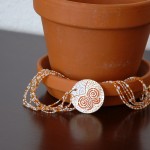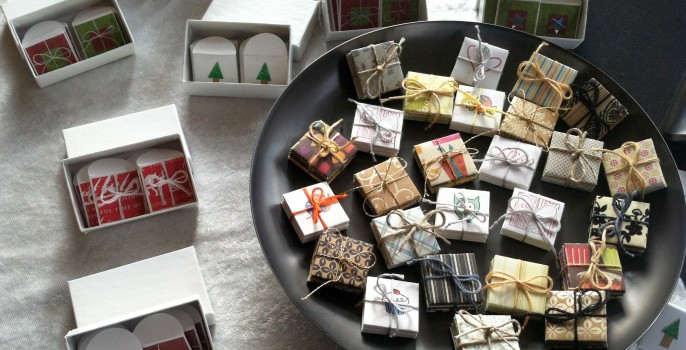Two years after opening my Etsy shop, I’ve come to a striking realization. I’m a hobby seller. It seems obvious in retrospect; I’m earning less than minimum wage on Etsy. I spend hours fretting over items and tearfully sell them for pennies on the dollar. I’m so grateful that anyone likes what I make that I’ve neglected to treat it like a business.
I’m not alone – there are legions of hobby sellers on Etsy undercharging for their labors of love. We’re vessels of creativity, hoarders of supplies. Is it so shameful to create without yearning for big profits? What’s the goal? Is there such a thing as too many beads? I don’t know the answers.
The biggest question looms – is it time to turn my hobby into a real business? It’s not a matter of commitment, but rather a fear of commercialization. I don’t want to cut corners and compromise the quality of my work. I don’t want to slap a pendant on a chain and declare it handmade.
Profit doesn’t have to be a dirty word. I need to come to terms with it. There are plenty of Etsy sellers that I deeply respect making money. There is a way to keep artistic integrity and still run a business. A weekend of introspection led me to some distressing conclusions about how I’ve been running my shop.
Time isn’t on my side
 Some of the things I love to create are too time-consuming to make a profit. I’ve had scores of compliments on my micro-seed bead necklaces, but each necklace takes 12 hours or more to complete. Charging any reasonable price for my time would make them prohibitively expensive. If I ever hit it big, I could never produce them fast enough. There’s no way to streamline the process. It’s just me, the smallest needle you’ve ever seen, and a magnifier light. It’s not a sustainable product for a business.
Some of the things I love to create are too time-consuming to make a profit. I’ve had scores of compliments on my micro-seed bead necklaces, but each necklace takes 12 hours or more to complete. Charging any reasonable price for my time would make them prohibitively expensive. If I ever hit it big, I could never produce them fast enough. There’s no way to streamline the process. It’s just me, the smallest needle you’ve ever seen, and a magnifier light. It’s not a sustainable product for a business.
The outlook isn’t so grim for my other items, but I still need to work smarter and produce faster. I love the creative process that goes into designing my napkin rings. I can spend hours choosing beads and revising a pattern to get it just right. It’s time to get real and overcome my disdain for re-using a pattern. Each unique item means new photos, a new description – not to mention coming up with a name. I have no idea how many hours I’ve dragged myself over the coals trying to name a set of napkin rings.
Supplies ate my profits
What do your supplies cost? That’s a question any serious seller should be able to answer, yet I’ve avoided thinking about it. I buy mixed beads and only use a few of them for each item. I buy wire by the spool and don’t know how much I use per item. I can think of nothing more mundane than evaluating my supplies and finding more cost-efficient ways to create items. Even the words “cost-efficient” send shivers up my spine.
Running a business means chewing the gristle as well as the meat, so it has to be done. It’s impossible to sensibly price items and figure out the best route to profit unless I know my supply cost. It’s time to do battle with my most feared enemy – math.
Yes Virginia, there is a customer
I have customers – I even have happy customers. I just don’t have enough of them. The writing has been on the wall; at craft shows, I hear squeals of delight about how beautiful the napkin rings are – if only I entertained. I don’t use cloth napkins. I wish my kitchen was bigger so I had somewhere to put these – I’d only use them once a year. Admirers are not customers.
Niche markets can be profitable, but it’s a hard way to build a business. The truth is, you only need so many napkin rings. I need to diversify the items in my shop. I might even need to stop making items that I adore if I can’t sell enough of them. Businesses can’t survive without customers.
Pricing is hard
In my mind, I’m competing against Bed, Bath & Beyond. I imagine customers looking with disgust at my prices and opting to buy the mass-produced equivalent. I need to remember that people value handmade items. I happily pay more for handmade items when I shop on Etsy – I even avoid some less expensive items, fearing that they’re poor quality.
Rather than match the hawkish retailer and drop my prices to the bottom, I need to respect my craft. I need to give myself permission to factor in supply costs, assume my time is worth at least minimum wage, and price accordingly with some meager profit.
I’ve mistakenly charged the same price on Etsy that I charge at craft fairs. I’ve failed to take into account the time spent taking and editing photos, writing descriptions and tags, and promoting my items.
I’m accustomed to being stuck in creativity ruts; a business rut is a whole new experience. I’ve made my confession – what is my penance? Change is difficult. I’m proud of my work. I’ve refined my creations, groomed my shop and improved my SEO. I’ve made treasuries, joined teams, Twittered my Facebook – but the sales remain stagnant. It’s time to get serious. Maybe math is my penance.
Get my latest articles straight to your inbox about once a month. Learn how to improve your Etsy shop, boost your sales and discover other sellers from the Etsy community.








I know this is a little late, but I thought I’d respond in case it helped someone else. I took a look at BrittanysBest shop on etsy and it looks like it has been closed for a year. If they ever see this, and haven’t completely given up, my best advice would be that you have to have some kind of audience for what you sell that is large enough to want to purchase from you. Not a lot of people are out looking for napkin holders, especially really expensive ones, however, if you geared your shop and packaging towards wedding gifts, WEDDINGS is where people would look for this type of item, and would be willing to spend a lot of money. If your packaging also looked beautiful enough for a wedding, and had an official “handmade” letter that came with your packages, told a brief story and let the person who is receiving it as a gift know how much time and care was put into each carefully hand crafted piece, how much attention was given to it and how special the napkin holders are, it would go so much further. If a small portion of your proceeds went to some kind of cause that was related to your items and meant something to you (that you really stood behind and cared for) even better.
I saw through your reviews that some of your items were geared towards weddings, some towards gifts in general, some towards christmas, etc. I really feel like zeroing in on weddings and maybe anniversaries is the way to go. You could contact wedding planners and go to trade shows for wedding planners where you could help in decorating with your napkin holders. Run facebook ads for people who are planning weddings and getting married or looking for wedding gifts to give someone. Go to different chapels or places weddings are held and speak to the coordinators there, hand out business info etc. You have to figure out who your customer is and why they’re buying from you, then go to where they are and let them know you’re here and why you’re so special. You have to rise above the rest and be different. You can do custom colors, sizes, etc and add personal touches that mean something to the bride and groom, or take custom orders as gifts.
This is just my two cents. Just some words of encouragement 🙂 If napkin rings are your passion, I really do think you could still make it work. If the quality is nice enough, even at a high price, you have customers out there, you just need to gear your items and shop towards them, go find them and then bend over backwards to make it special for them and you can make a good living out of your craft.
Thank you for such an honest post. It really rang a lot of bells with me, and sometimes it’s just nice to know that you’re not alone! I have been struggling with my pricing because photos and product descriptions really are time consuming. Plus, I would like to sell in local boutiques, which take at least 30% on consignment. Still, I need to take into account the value of a product to a consumer, and not make it unaffordable either. In the end, this leaves me with minimum wage…sigh.
Great writing! I too am an etsy seller, and I find that I love making things, but sometimes it feels like crocheting 20 scarves at four hours apiece for only $20 becomes more monotonous and less fun. I love sharing my crafts with the world, but it really is hard to get over this frustration and dissatisfaction from time to time. It’s nice to hear that we are not alone 🙂
Thanks for sharing your story. If I may, I would like to share something I did from the very beginning: once I started selling my bags I actually began tracking my costs. A family member placed an order for fifteen of my bags. It was that order that launched me into a business; before that, I was just making them and giving them away to friends and family members. But when I got my first official order I knew I needed to get serious! I didn’t even have a name for my business and I had to find one fast.
I took one of those note blocks and I would tear a page off for every bag I was working on. I made a list of everything I used to make the bag, including the cost of the neckties, piping, canvas pieces, the decorative cloth for the outside and even the labels I had specially made for my bags…every cost counted. After making about 30 bags, I started to get a clear range of what a bag would cost me to make. Of course, this did not include my time. By doing this, I was able to settle on a fair price. Then my uncle ordered 95 bags for Hilton Worldwide and there was no turning back.
What else did I learn? I shop smarter now and research for better prices on supplies—I do what I can to keep costs low. Why pay $3.00 for a zipper from JoAnn’s when I can find it online for 25 cents! I learned to streamline the process and cut down the time it takes to make something, without losing the creativity. I can do the cost calculations in my head now and I can keep that in mind when I am building a new creation. I feel better knowing that I am turning a reasonable profit.
Hey April I completely agree, I have done exactly what you have. It seems like a boring chore at the beginning but by incorporating the mundane list making into your routine you will soon do it as a matter of course and find it a useful tool to have to hand in the end.
When my supplies come in, I log them down and as I know how many bags 1 metre of fabric will make I divide the cost including postage by the number of bags it will make – it’s useful to know for that particular bag but also as a guide for future purchasing and what I can afford to spend on my next metre of fabric.
I have a folder now with sections for ribbon, plain fabric, pvc, etc which lists cost, supplier, cost per bag. It allows me to see the realistic costs and helps me avoid frivolity in my purchasing. I can buy what I like but I don’t disguise it as a business purchase!
Good Luck Brittany, Don’t lose heart, your shop is lovely and this post is fab! I really enjoy your blog! Much love, Helen x
This is a REALLY great post. I’m not crafty, and I don’t sell on Etsy, but I have a masters degree in business, and I can absolutely get behind what you’re saying. Like you, I am willing to pay more for an item than handmade that’s not, simply because I want to support small businesses like your own. However, you can only take it so far before overpricing and lack of sales becomes a reality. Unfortunately a good portion of people have no understanding of what it takes to create something from scratch–from the designing, to the production, to the promotion–and they think that mass-produced goods are the “standard” for pricing.
Anywho, I stopped by to visit your shipping calculator & ended up going through some older posts on your blog. I really enjoy it. I wish you luck with your Etsy shop & I will check it out for sure!
I have been coming to some of the same realizations. Thanks for expressing it so well.
Peace in Wood,
Scott
I so understand what you are saying here, and I know there are many other people feeling the same way!!! The conclusions you have come to here are so difficult (and so is the MATH…the dreaded math)! I came to the same conclusions years ago, and that is the reason I create and make things as gifts, rather than items for sale. You have so much talent and creativity. Hopefully you can find a financially feasible way to share that talent with others. Lots of luck to you! Brandy
Great post! I found myself nodding a lot while reading this post. I have items that I love to make, but take too long to complete and I haven’t calculated supply costs ever. 🙂 Thanks for letting me know that I am not alone.
Onward!